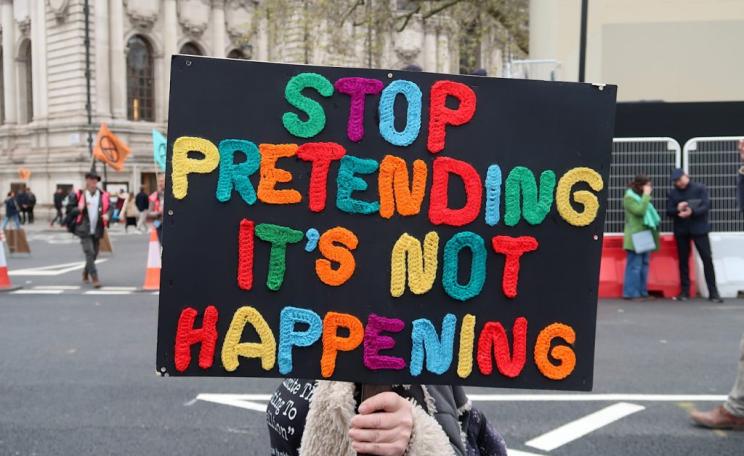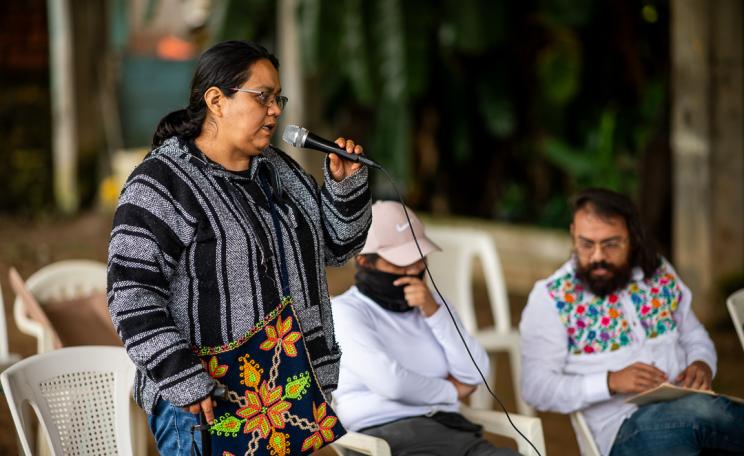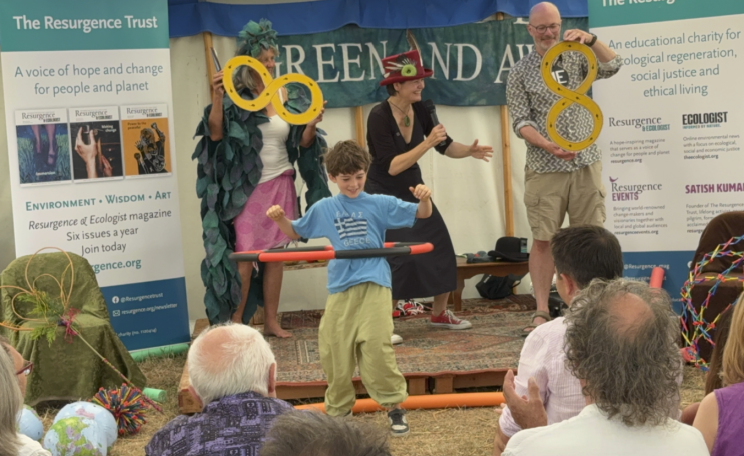All scientists need to figure out how to communicate what we do - we have that responsibility.
Kyoto takes audiences to the heart of the 1997 UN climate negotiations in Japan. On one side, big oil and big money, and on the other climate scientists, international diplomats, politicians and activists.
At stake is the world’s first legally binding deal to slash climate-trashing greenhouse gases. At stake is the future of the world.
The show premiered in Stratford-upon-Avon. It has an all-star team behind it: produced by the Royal Shakespeare Company and Good Chance production; written by Joe Murphy and Joe Robertson (the team behind The Jungle about the Calais refugee camp); directed by Stephen Daldry and Justin Martin (Stranger Things and the First Shadow); and starring Tony-nominated Stephen Kunken (The Handmaid’s Tale and the Wolf of Wall Street) as US oil lobbyist Don Pearlman.
Paymasters
One of the original participants at the Kyoto talks has already seen the play. Climate scientist Ben Santer served as convening lead author of chapter eight of the Intergovernmental Panel on Climate Change’s (IPCC’s) Second Assessment Report (Detection of Climate Change and Attribution of Causes), and was a contributor to all six IPCC scientific assessments.
“It’s improbable that international climate negotiations could be successfully transferred to an enthralling play, but it actually works", he told The Ecologist.
"The audience was completely gripped and got the gravity of the moment - that, in a very real sense, the fate of the planet was being decided there in Kyoto in December 1997."
Attendance at a COP negotiation was not a prerequisite for understanding the play, according to Santer. “The audience comes away with the sense that this was, and remains, a battle between the forces of good and evil: the forces of rationality and science against those intent on maximising profit,” he says.
Pearlman, a lawyer representing fossil fuel companies, was determined to destroy any science showing that humans were influencing the global climate. “The words ‘scorched earth strategy’ are used multiple times in the play, and that's what Pearlman and his paymasters were engaged in in the mid-1990s,” Santer says.
Powerful
Of course, the science won out and, in the end, 192 countries agreed the Kyoto Protocol, setting binding emission reduction targets for 37 industrialised countries and economies in transition for the first time.
Since 1997, climate science has moved on significantly, with the IPCC’s 1995 conclusion that burning fossil fuels was “on balance of probabilities” heating the planet has now been updated to being “unequivocal”.
The Kyoto summit was COP3. COP29 ended with a refusal by certain countries to discuss phasing out fossil fuels as a way of mitigating climate change, while its Azerbaijani president claimed they were a ‘gift from god’, with emissions still rising, the goal to keep global temperature rise within 1.5C vanishingly unlikely, and 2024 expected to be the among the hottest years on record.
All scientists need to figure out how to communicate what we do - we have that responsibility.
So what progress has really been made?
“A colleague once described it as fighting with one hand tied behind your back - folks like Don Pearlman and the fossil fuel majors are using both hands and very, very powerful public relations machinery to cast doubt on the science, to attack the reputations of individual scientists, to argue that the planet isn't warming, or to argue that even if it is, it's all natural,” he says.
Clarity
That struggle between climate science and the forces intent on preventing humanity from addressing the problem continues today, with Santer pointing to incoming US president Donald Trump and his officials using words like “hoax” and “conspiracy” to describe the mature science of climate change.
Santer admits he asks himself all the time if scientists could have done more to avoid the current situation. “It feels a bit like failure to know that here in the US we’ve elected a president whose whole world view is antithetical to science and scientific understanding,” he says.
“We probably could have done a better job with hammering home to the public and to politicians the fierce urgency of why we need to act decisively now to limit emissions of greenhouse gases,” he admits.
However, Santer believes that the fundamental mismatch in the fight against businesses backed by many millions of dollars would have continued, irrespective of the strength of the science and the clarity of the messages. “They would have continued with their scorched earth strategy, as Don Pearlman refers to it in Kyoto,” he says.
Scientists
Kyoto provides audiences with what mathematicians call an existence principle—proof that something difficult is possible, Santer says. “Back in December 1997, the entire world signed the agreement, even Saudi Arabia, despite the efforts of Pearlman,” he says.
“My hope is that we can actually now get down to the hard business of doing something about the problem, rather than just signing agreements – we’re running out of time,” he says.
Santer is hopeful that plays such as Kyoto can help give the public a window into what is at stake.
“When I write a scientific paper, it will reach a few 100 people, maybe a few more, if I’m lucky. Kyoto has much broader reach. It will reach audiences of many, many thousands, who are not climate scientists, and it will give them food for thought,” he says.
Responsibility
“One of the more memorable lines in the play for me is when Pearlman's wife Shirley asks, ‘Don are we on the wrong side of history?’ and Pearlman replies, no, and that even if human caused climate change is a problem, Americans will find solutions to it, and goes into a long monologue about American exceptionalism,” he says.
Santer hopes that Kyoto will make people think about the consequences of being on the wrong side of history. “Maybe that's the best that art can do, to give people pause for thought about what it means if you ignore this, and we continue to have a climate system that is spiralling out of control, with fundamental changes in our climate system over a couple of human lifetimes,” he says.
He also hopes that it will prompt a response from scientists. “A play is one way of communicating. There are also podcasts, art installations, there are movies like Don't Look Up. Scientists need to partner with creative forces to explain in words and images, what we're doing to the climate system and what the likely outcomes are if we do nothing.
“All scientists need to figure out how to communicate what we do - we have that responsibility. There are real opportunities there, and Kyoto provides scientists with a glimpse of what they might look like.
This Author
Catherine Early is a freelance environmental journalist and chief reporter for The Ecologist. Find her on Bluesky @catearly.bsky.social. Kyoto will run at Soho Place for 16 weeks from Thursday, 9 January through to Saturday, 3 May 2025. Tickets are available from sohoplace.org.







